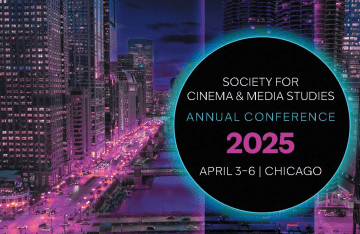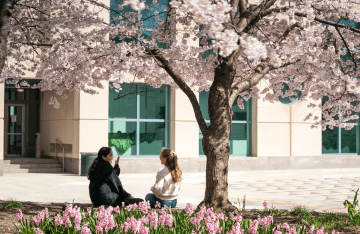Annenberg Presentations at NCA 2024
The National Communication Association held its 110th annual convention in New Orleans.

The National Communication Association's 110th Annual Convention, "Communication for Greater Regard," was held from November 21-24 in New Orleans, Louisiana.
Annenberg's contributions to the convention are listed below.
- Professor Guobin Yang - Panelist, “The Tenth Annual U.S.-China Communication Scholars Summit”
- Associate Professor Sarah J. Jackson - Panelist, “Disregard for Others: Far-Right Publics in the U.S. and Beyond”
- Director of Annenberg Public Policy Center's Leonore Annenberg Institute for Civics (LAIC) R. Lance Holbert - “Creating a Foundation for Future Theory Innovation in Media Psychology”
In order to address current challenges to theory building in media psychology, the following four issues need to be addressed: (1) identifying which theories and constructs have the greatest predictive power when there is overlap concerning a given outcome of interest (i.e., the Piranha Problem), (2) reducing the use of duplicative concepts, (3) incorporating multiple definitions of time in media psychology research, and (4) expanding the range of generative mechanisms being explored and tested.
- LAIC Research Associate Huma Rasheed - “Exploring Communicative Correlates of Intellectual Humility: Agentic and Communal Linguistic Markers”
This study aimed to further our understanding of the linguistic correlates of intellectual humility by exploring its association with agency and communion. Using the Big Two dictionary, we measured the use of agentic and communal terms within text written by a sample of adult university students in the United States (N = 867). The results showed a significant interaction effect of agentic and communal language on intellectual humility. According to the findings, intellectual humility was significantly related to the higher use of both agentic and communal terms.
- Doctoral candidate Melissa Skolnick-Noguera - "We, the Artists"
"We, the Artists" is a short film that features a reflection on how artists based in the Philadelphia region were overlooked during the height of the pandemic, and how they have been envisioning a new future. The film utilizes a combination of live action footage, animation, and voiceover to portray this moment in time which calls for a renewed commitment to cultural equity.
- Doctoral candidate Azsaneé Truss - “Conspi(racism): Hip-hop Music and the Vernacular Theorization of the Crack Conspiracy”
Through a critical multimodal discourse analysis of hip-hop songs which sought to theorize the crack conspiracy, this paper is an intervention into the study of conspiracy theorizing among Black Americans. It seeks to disrupt the blanket pathologizing of these practices, positing that conspiracy theories amongst Black Americans are often attempts to uncover how our subjugation is being maintained via racist plots, particularly as a group that has historically been the target of such exploitative schemes.
- Doctoral student Cienna Davis - “Angry Black Femmes and the Affective Economy of Digital Blackface”
This paper brings together Affect Theory and Black Feminist Theory to explore the currency of Black femme outrage within the digital attention economy. I examine this dynamic within the increasingly gendered phenomenon of digital blackface, focusing on the popular trend of TikTok dance challenges and the so-called “Black TikTok Strike” of June 2021.
- Doctoral student Sim Gill - “Fighting Back: Defining a Market for Women’s Safety”
This paper delves into the critical intersection of economics and communication within the context of women's safety, specifically through the lens of self-defense products. It addresses the alarming prevalence of gender-based violence globally, highlighting the pervasive fear it instills in many women's lives. By framing the discussion around the concept of a "market for women's safety," the paper underscores the multifaceted nature of safety beyond mere physical protection, emphasizing the intricate relationship between markets, morality, culture, and affect.
- Doctoral student Adetobi Moses - “The Future of Digital Pandemic Archives: Mediating between the Local and the Global”
The paper demonstrates how digital pandemic archives can facilitate creative memory practices in future Covid-19 commemoration efforts. The paper draws on my research with the digital pandemic archive, Corona Diaries, and the focus groups held with adult members of Philadelphia communities, in which they listened to and discussed a selection of personal narratives from the oral archive. In showcasing how digital archives can help facilitate commemoration practices in post pandemic times, I argue for thinking about crisis moments as conjunctural openings for researchers to experiment with creative methods for understanding the individual and collective experiences of a given crisis beyond its unfolding.
- Doctoral student Qijia Ye - “Do Nostalgia or Regret Appeals Work on Audiences Outside of the Target Audience?”
This study investigates the impact of nostalgia and regret messages, initially targeting rural adults with obesity, on a non-obese college student sample. With obesity rates steadily rising, effective communication campaigns are crucial. Emotional appeals such as nostalgia, have shown promise in reducing anger, reactance and counter-arguing, and increased intentions particularly compared to its "opposite" emotion: regret. However, little is known about their effects on unintended audiences. The current study examines whether nostalgia or regret appeals initially tailored for a specific audience can elicit similar outcomes or message engagement from a non-target audience using physiological measures.



